Few local nonprofits have changed more in the last few years than Oregon’s main walking advocacy group.
Since 2010, Oregon Walks has renamed itself, relocated its tiny office, passed most of its board seats to new volunteers and shifted its strategy away from direct oversight of local government and toward grant-funded partnerships with other community organizations.
When Executive Director Noel Mickelberry took the reins Monday morning, the group’s transition was complete. We caught up with Mickelberry, 26, as she prepared to start the 24-hour-a-week job to talk about the differences between walking and biking advocacy and the new vision she’s been hired to execute.
How long have you lived in Portland?
Since I was 4, so I pretty much grew up here. I was born in Chicago. I went to Madison High School, on 82nd, and then went to Oregon State for my undergrad and studied philosophy. That was when I got interested in active transportation. At the time I didn’t really think of it that way. I was just riding my bike all the time in Corvallis. Environmental ethics, critical social theory – I was really interested in all of that.
OK, if you could introduce one philosophical concept into the transportation world, what would it be?
I’ve had this dream of writing a book about transportation ethics. Mode is kind of an ethical decision that affects the city, affects the environment, and affects our health: when it comes down to it, philosophical quandaries.
You’ve already been helping run Oregon Walks as board vice president since your predecessor Steph Routh left the staff last year. How did you get involved with OW?
I did my graduate capstone project at Oregon Walks. I had been a grantwriting intern there in 2010 with Steph. As I was finishing up my graduate program, I spent about 20 hours a week for three months coordinating Walktober and working on the Plans and Projects committee, sitting on citizen advisory committees. Then I joined the board 10 months ago and have been pretty heavily involved since then.
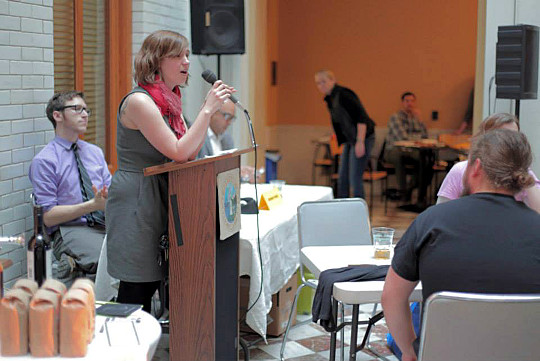
(Photo: Tyler Bertram)
It seems like the biggest biking question in Portland right now is whether it’s more important to make the central city excellent or to make the outer city decent — or maybe just less crappy. Where do you come down on this when it comes to walking?
If you look at 2013, seven of the 10 pedestrian deaths happened out in East Portland where those conditions are nonexistent, almost. If people are dying on our streets, this has to be the priority. It’s not to say that improving conditions in the inner cities is not important at all. But we really want to see money going where people’s lives are at risk. The whole city needs to be at the level where people can access their community.
I’ve been working on a post about the Bicycle Transportation Alliance, which is the same age as Oregon Walks. The BTA changed a lot in the early 2000s when they got a contract to teach Safe Routes to Schools classes. After that they were able to hire more staff, plus they got the visibility of being in the schools and so on. Do you see a path like that for Oregon Walks?
We have been reliant on grants. It’s a combination of building up our membership of individual donors, working with businesses. I don’t know if that kind of big jump is in our near future. I really want to get us to that sustainable place.
Advertisement
Where do you see Oregon Walks in 4, 5 years?
I think walking is such a cross-sector issue that I see my role over the next couple years as connecting us to other groups that are already doing work around health and transportation and equity, and finding ways that we can help them meet their mission while also including the walking environment. There’s a lot of work being done where improving the walking environments would help.
So stop me if I’m wrong, but it’s something like, you find an organization that’s working on an issue, and then Oregon Walks brings in some money or maybe some policy expertise and says, “And walking! Don’t forget about walking!” Can you name some particular organizations that might be good partners in that model?
We’re already having conversations with APANO and the Jade District. Rosewood. Verde. Adelante Mujeres. A big piece of my first couple months is going to be what’s going on out there. I’m really looking forward to seeing who’s working on what and where we can collaborate and support.
Because so few people think of themselves as “walkers,” it’s really hard to get people excited about walking advocacy. What’s an example of something Oregon Walks can do to change this?
It’s when it affects your own life. I’m thinking of my neighbor. They have two kids and we live two blocks off Powell and Franklin. It’s used as a cut-through often to avoid traffic on Powell, and there’s no treatment on our street, so people are just flying through. I was talking to her about Oregon Walks. It all of a sudden was a light bulb in her head: this is something that really matters to me and my kids.
That’s great, but it sounds hard to scale up. How do you get more conversations like that to happen?
It has a lot to do with marketing and making sure that we help people in those conversations. We went to a community budget forum at David Douglas. There were tons of people there. Most of them were there for some specific purpose. But almost all of the people that went out there that spoke, they would always add, “And I would also like to be able to cross the street and walk to school safely.” Those concerns are there.
If people want to help, what should they do?
Get in touch with me. I just want to get as many people involved as possible. Especially from a BikePortland audience, I would love to hear more about what people think about the difference between the two.
Starting today, you can reach Noel at noel@oregonwalks.org.

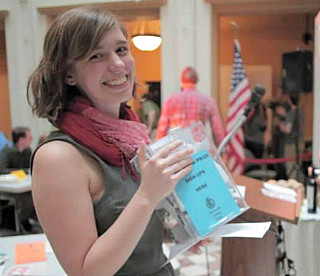
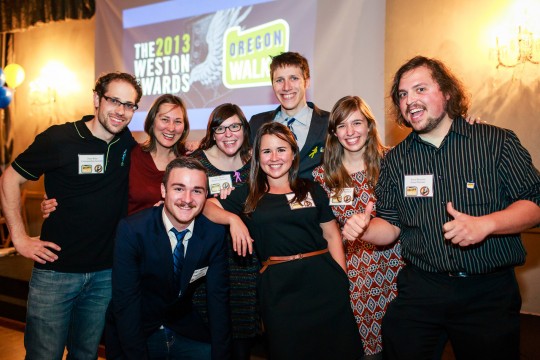
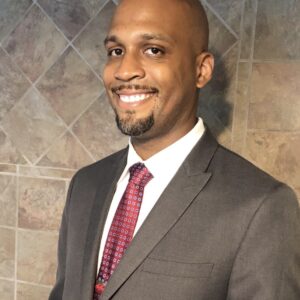
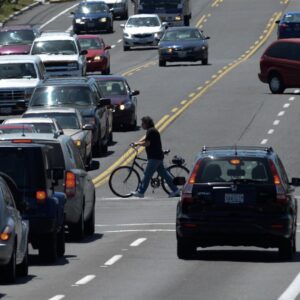
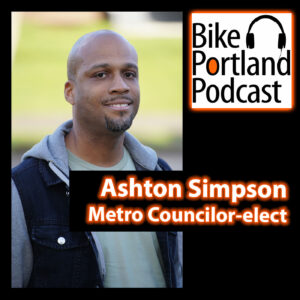

I had the tremendous pleasure of serving with Noel while she was on the board of Oregon Walks and can say that she’s inspiring, hard working, and extremely organized. Portland is lucky to have her now serving as Executive Director.
Shameless plug: if you enjoy walking (or, eh, living, as the case may be out in East Portland), you should definitely get involved with Oregon Walks. Lots of fun projects and a fantastic set of volunteers over there.
YEAH NOEL
Honestly, I’ve said it before and I’ll say it again. To make riding bikes better, you have to improve the pedestrian environment first.
It’s the old, the chain is only as strong as the weakest link cliche.
Congratulations and good luck.
Great to have you at the helm, Noel!
Let’s create a culture of walking.
Congrats to Noel!
Correction, thought: the BTA had an advocacy director before the Safe Routes work.
Thanks, Evan – you certainly ought to know! I’ve changed to “hire more staff.”
“It all of a sudden was a light bulb in her head: this is something that really matters to me and my kids.”
This is one of the saddest and most telling aspects of our lopsided transportation system. Until someone or something shakes people and shows them what’s what, even those that don’t drive (or frequently use alternative modes, such as walking) are perfectly willing to accept the “natural” state of being constantly threatened with death by speeding, inattentive pilots of two-ton missiles.
It almost, almost seems like this must be a little bit of what it’s like to live someplace like North Korea, where a constant threat of draconian punishment for seemingly trivial things is always hanging over your head, but you hardly notice…
Congrats Noel! We’re so glad to have you leading the organization. You’re a rock star!
Anything Mickelberry can do to help conditions for walking be better will likely be welcomed. Biking is great, but for some things, walking is much better. It’s very important and helpful to enhance conditions for walking. Wider sidewalks, better visibility at intersections, various means by which to moderate vehicle traffic, all can be worthwhile investments to make.
“Mode is kind of an ethical decision that affects the city, affects the environment, and affects our health: when it comes down to it, philosophical quandaries.” Wow, yes! Mode IS an ethical decision. I’d never realized it in such terms, thank you!